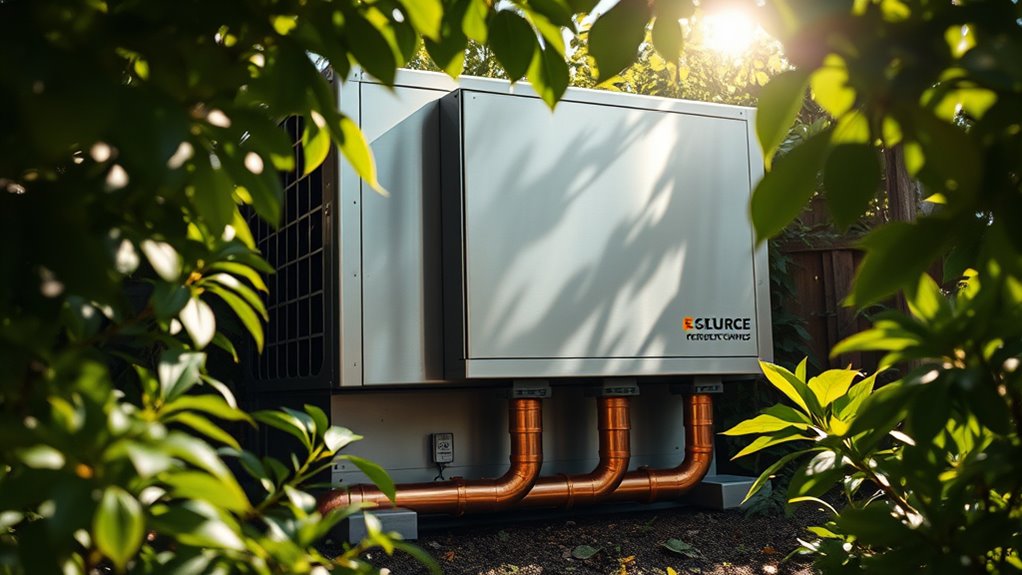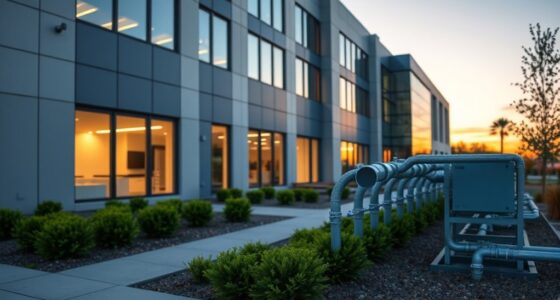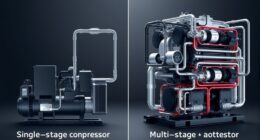Hybrid geothermal systems combine ground source heat pumps with extra heat sources like electric or gas heaters, helping you save energy and adapt to seasonal changes. During milder weather, your system mainly relies on the ground, while in colder months, auxiliary sources kick in to keep your home warm efficiently. This dual approach reduces wear and tear, extends component life, and boosts overall performance. To discover how these systems maximize comfort and efficiency, keep exploring the details.
Key Takeaways
- Hybrid geothermal systems combine ground source heat pumps with auxiliary heat sources for flexible climate control.
- They seamlessly integrate with existing HVAC infrastructure, switching between sources based on conditions.
- These systems optimize efficiency by relying on ground heat in mild weather and supplementing during extreme cold or heat.
- Using renewable ground energy reduces wear on auxiliary components, lowering maintenance and extending system lifespan.
- They adapt seasonally and climatically, ensuring consistent comfort while minimizing energy consumption and environmental impact.

Have you ever wondered how we can maximize the efficiency of geothermal energy? One effective way is through hybrid geothermal systems, which combine different heat sources to optimize performance. These systems leverage a ground source heat pump, utilizing the stable temperature of the earth to provide heating and cooling. By tapping into the ground source, you benefit from a highly energy-efficient method that reduces reliance on traditional HVAC systems, cutting energy costs and lowering your carbon footprint. The key to their effectiveness lies in their ability to adapt to varying conditions, making them a smart choice for energy-conscious homeowners and businesses alike.
Hybrid geothermal systems are designed to work seamlessly with existing heating and cooling infrastructure, enhancing overall energy efficiency. During colder months, the system can supplement the ground source heat pump with an auxiliary heat source, such as a gas or electric heater, when the ground temperature dips below optimal levels. Conversely, in milder weather, the system relies predominantly on the ground source, which is inherently energy-efficient because of its stable temperatures. This dual-source approach ensures you’re not overtaxing the ground or wasting energy, maintaining consistent comfort while optimizing efficiency.
Hybrid systems optimize efficiency by combining ground source heat with auxiliary heating in colder weather.
One of the major benefits of these systems is their ability to adapt to seasonal and climatic variations. In winter, when the ground temperature is colder, the hybrid system intelligently switches or augments its operation to maintain efficient heating. During summer, it can switch to cooling modes that utilize the ground’s natural thermal properties, again maximizing energy efficiency. This flexibility means you’re not stuck with a one-size-fits-all solution but instead have a system that dynamically responds to your environment, delivering maximum performance with minimal waste.
Moreover, hybrid geothermal systems help extend the lifespan of the components involved. Since they’re designed to operate primarily using the ground source, which is consistent and renewable, the wear and tear on auxiliary heating elements are minimized. This reduced strain translates to lower maintenance costs over time and greater reliability. By combining the strengths of ground source heat pumps with supplementary heating or cooling sources, you get a balanced, efficient system tailored to your specific climate needs.
In essence, hybrid geothermal systems are about smart energy use. They harness the natural, renewable power of the ground while supplementing it with additional sources when necessary. This dual-source approach not only boosts energy efficiency but also enhances system resilience, ensuring you stay comfortable year-round while making environmentally responsible choices. It’s a sophisticated solution that maximizes the potential of geothermal energy, giving you a practical way to save money and reduce your ecological impact. Additionally, advancements in Kia Tuning demonstrate how integrating upgraded components can further optimize system performance and longevity.
Frequently Asked Questions
How Do Hybrid Geothermal Systems Compare in Cost to Traditional Systems?
You’ll find that hybrid geothermal systems generally have higher initial installation expenses compared to traditional systems due to their complex setup and equipment costs. However, when you consider the long-term cost comparison, they tend to save you money through lower energy bills and reduced maintenance. While upfront costs are higher, the energy efficiency of hybrid geothermal systems makes them a smart investment over time.
What Maintenance Requirements Are Specific to Hybrid Geothermal Setups?
You need to perform regular maintenance on your hybrid geothermal setup, including system flushing to remove debris and prevent corrosion. Keep an eye on corrosion prevention measures, like inspecting for signs of rust or mineral buildup, especially in the water loops. Additionally, schedule professional checkups to ensure the dual-source heat pump operates efficiently. Proper maintenance guarantees longevity and peak performance of your hybrid geothermal system.
Can Hybrid Systems Be Integrated With Existing Heating and Cooling Infrastructure?
Yes, you can retrofit hybrid geothermal systems with your existing heating and cooling infrastructure. This setup offers excellent retrofit compatibility, allowing you to upgrade without overhauling your current system entirely. System integration is straightforward, as the dual-source heat pump can work seamlessly alongside your traditional equipment. This means you’ll benefit from improved energy efficiency while maintaining your existing infrastructure, making the shift smoother and more cost-effective.
How Long Is the Typical Lifespan of a Hybrid Geothermal System?
You can expect a hybrid geothermal system to last around 20 to 25 years, thanks to its durability and robust components. With proper maintenance, its components maintain longevity, ensuring reliable performance over time. The system’s lifespan depends on factors like installation quality and environmental conditions. Regular upkeep keeps your system functioning efficiently, prolonging its life and maximizing your investment in sustainable heating and cooling.
Are Hybrid Geothermal Systems Suitable for All Climate Zones?
Yes, hybrid geothermal systems are suitable for most climate zones thanks to their climate adaptability. They can efficiently switch between geothermal and traditional heating or cooling methods, making them versatile across different conditions. Additionally, you can customize the system’s scalability to match your home’s size and energy needs, ensuring peak performance. This flexibility makes hybrid geothermal systems a smart choice for various climates and future expansion plans.
Conclusion
By combining the efficiency of geothermal with the flexibility of alternative sources, hybrid geothermal systems offer reliability, savings, and sustainability. They optimize energy use, adapt to weather changes, and reduce environmental impact. You’ll enjoy consistent comfort, lower costs, and a greener footprint. Embrace a system that balances innovation and practicality, integrates technology and nature, and empowers you to make smarter, more sustainable choices for your home and the planet.









